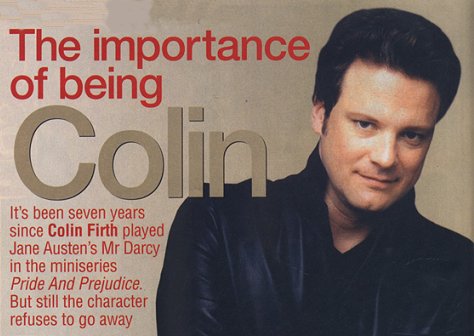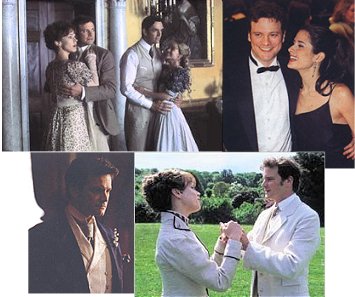"Since she's always been very nice to me, I rather condescendingly accepted it from her but then it astonished me to discover that there really was a phenomenon going on around the whole series." This phenomenon sparked a chain reaction because if Colin had not played the handsome and arrogant Mr Darcy, he would not have ended up in Helen Fielding's best selling book Bridget Jones' Diary as Bridget's big crush from Pride and Prejudice, which led to his role opposite Renée Zellweger in the 2001 film version as her romantic hero, a character named—what else? —Mark Darcy. "It's hard to know how it changed my career because I don't know what my career would have looked like if I hadn't done it, " Colin reflects on the miniseries. "I was 35 when I did it and was reaching an age where I thought that the romantic leading man was passing out of my scope and it was almost time to just do character roles and joyfully get fat!" he laughs. "So it took me very much by surprise to suddenly put the leading man and the romantic character back on the agenda in terms of the sort of work that has come my way." The 41-year-old actor, who has a 12-year-old son William with US actor Meg Tilly and a 15-month-old son Luca with his Italian wife of four years Livia Giuggiolo, looks rather embarrassed when asked if he considers himself as romantic as his screen image. "I suppose I am as much as everybody is," Colin hesitates, "but I don't think I'm an excessively romantic guy. I find that romantic clichés don't appeal to me particularly. I am not a fan of Valentine's day, for instance, because I don't like an appointed day for roses and the show of romance. I think it's probably quite important to be imaginative and show an element of surprise about it all." The son of two academics, David and Shirley Firth, Colin spent his early years living in Nigeria before his family finally settled back in England when he was five. At 18 he joined the National Youth Theatre and then trained at the London Drama Centre before making his London stage debut in 1983, replacing Rupert Everett in Julian Mitchell's play Another Country. A year later he co-starred opposite Rupert Everett as another character in the film version of that play, and now he's reunited on screen with his close friend in The Importance of Being Earnest. In the farcical tale of mistaken identity, Colin plays bachelor Jack Worthing, who invents an imaginary alter ego—a trouble-making brother named Ernest—as an excuse to escape to the city and away from his responsibilities in the country as guardian to his sheltered young niece Cecily (Reese Witherspoon). But while in the city he falls in love with aristocrat Gwendolen Fairfax (Frances O'Connor), who accepts his marriage proposal because she's convinced she is destined to marry a man named Ernest. Meanwhile, Jack's close friend Algernon, played by Rupert Everett, takes advantage of his friend's preoccupied state by paying a visit to Jack's country estate to meet the pretty Cecily, introducing himself as Ernest and discovering that she has long dreamed of marrying that mystery errant brother. Adding to the drama and comedy is the eventual return home of Jack, Gwendolen and Gwendolen's mother, the formidable Lady Bracknell (Dame Judi Dench). "There is nothing more intoxicating for an actor and nothing sets you on fire more than good language," Colin says of his attraction to the role. "So, when the language vibrates as it does with Oscar Wilde, it becomes a very enjoyable experience. One of the challenges is that you actually to have to process it through your intellect and be equal to it, which makes it an incredible intellectual challenge."
The quietly spoken Colin looks a little overwhelmed with all the media attention he has endured thanks to his Darcy fame, but he is no longer surprised by the fascination. "I'm used to journalists asking me about Darcy because when you're writing a story it's bound to come up, " he sighs. "But I actually just recently played a character called Colin in a film (Hope Springs) and I'm thinking of having myself billed in the credits as 'Colin played by Mr Darcy' just so people will know!" Despite the presence of Darcymania, as one English newspaper coined it, Colin insists he can live his life in a relatively low-key fashion. "Of course, I am not Mr Darcy and if people expect that when they meet me, they will be disappointed," he offers bluntly. "But I did a film called Fever Pitch in 1997 (based on the Nick Hornby novel) about a soccer fan, which was not very glamorous. I played a sort of modern-day slob and it was quite clear that I was a profound disappointment to some of the Darcy fans," he adds with a chuckle. "However, I
suddenly found
I was very welcome in pubs in north London because those people used to
seem nervous about getting their grammar wrong around me and after this
film I'd find myself greeted with a slap on the back and an offer of a
drink. Finally people wanted to tell me how bad they thought my last
film
was because I was one of the boys and could take it!"
|

